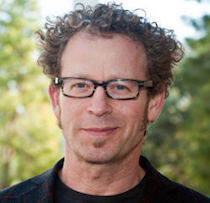ABOUT
TOPICS
TESTIMONIALS
About Ken Goldberg
Award winning Roboticist, Filmmaker, and UC Berkeley Engineering Professor Ken Goldberg is a popular public speaker who combines compelling images and videos in dynamic presentations on emerging Artificial Intelligence and Robotics technologies, sharing insights about what isn’t new, what is new, and how we can prepare for the future.
Ken trains the next generation of researchers and entrepreneurs in his research lab at UC Berkeley; he has published over 200 papers in robotics and social media and holds 8 US Patents. Ken is a pioneer in technology and visual expression, bridging the “Two Cultures” of Art and Science. With unique skills in creative problem solving, invention, and thinking on the edge, Ken has presented over 400 keynote and invited lectures to audiences around the world at events such as the World Economic Forum, Aspen Ideas Festival, Google Zeitgeist, TEDx, Web 2.0, SXSW, and at Google, General Electric, Intel, Cisco, Fujitsu, Siemens, Autodesk, Samsung, Tata, Vodefone, Deutsche Telekom, Fidelity, and Flextronics on topics such as the five listed below.
Ken and his graduate students pioneer research in optimal robot grasping, motion, and design for applications ranging from surgery to manufacturing to precision agriculture to social media. Ken’s artwork has appeared in 70 exhibits including the Whitney Biennial and he developed the first provably complete algorithm for part feeding and the first robot on the Internet. Ken served as Editor-in-Chief of the IEEE Transactions on Automation Science and Engineering (T-ASE), Co-Founder of: the Berkeley Center for New Media (BCNM), Hybrid Wisdom Labs, the Moxie Film Studio, the African Robotics Network (AFRON), and Founding Director of UC Berkeley’s Art, Technology, and Culture Lecture Series. Ken’s projects are regularly featured on television, radio, and in publications such as the New York Times, The Atlantic, and der Spiegel.
Ken was awarded the NSF Presidential Faculty Fellowship from President Bill Clinton in 1995 and elected IEEE Fellow in 2005.
With unique skills in creative problem solving, invention, and thinking on the edge, Ken has engaged audiences around the world in over 400 keynotes.
Musk vs. Zuck: Are AI & Robots a Threat…or an Opportunity?
Artificial Intelligence (AI) has surpassed humans at Jeopardy and Go, and driverless cars are widely believed to be around the corner. News articles claim we’re on the brink of a “Singularity” where robots will steal 50% of our jobs. Are AI and Robots an existential threat to humans as Elon Musk warns? Or is Mark Zuckerberg right in stating that humans have many good years ahead? “Automation Anxiety” has a long history, with widespread pronouncements about the imminent loss of jobs to Automation in the 1950s, 1960s, and 1980s. Drawing on his experience as a robotics and AI research expert, Goldberg explores these issues in three parts:
- What Isn’t New
- What Is New
- How We Can Prepare
Ultimately, Goldberg reveals how new innovations will empower humans, not replace them, revealing the potential for new trends such as “Cloud Robotics”, and “Multiplicity”.
The New Wave in Robot Grasping
Despite 50 years of research, robots remain remarkably clumsy, limiting their applications in home decluttering, warehouse order fulfillment, and robot-assisted surgery. The First Wave of grasping research, still dominant, uses analytic methods based on screw theory and assumes exact knowledge of pose, shape, and contact mechanics. The Second Wave is empirical: purely data driven approaches which learn grasp strategies from many examples using techniques such as imitation and reinforcement learning with hyperparametric function approximation (Deep Learning). The New Wave is based on hybrid methods that combine analytic models to bootstrap Deep Learning models, where data and code is exchanged via the Cloud using emerging advances in cloud computing and big data. I’ll present our lab’s work on the Dexterity Network (Dex-Net), an emerging New Wave approach that allows robots to grasp a broad range of objects.
Cultivating the Uncanny: Art, Fear, and Fascination with Technology
Engineers, animators, and designers apply the concept of the Uncanny Valley to technologies from AI to Robots to Siri. In 1919, a year before the word “robot” was coined, Sigmund Freud published an influential essay tracing the concept of the Uncanny back to the Renaissance. Goldberg illustrates this history with art that explores the shifting borders between the digital and the natural, including his Emmy-nominated short doc film that explores our collective fear and fascination with robots, the most human of our machines.
Brainstorming At A Global Scale
To brainstorm at the scale of social media, we can use techniques from an unlikely source: Robotics. Goldberg presents recent results on social innovation and collective brainstorming work with the U.S. State Department, General Motors, and the State of California.
Putting the “Turing” into ManufacTuring: Recent Developments in Algorithmic Automation
Automation for manufacturing today is where computer technology was in the early 1960’s, a patchwork of ad-hoc solutions lacking a rigorous scientific methodology. CAD provides detailed models of part geometry. What’s missing is formal models of part behavior and frameworks for the systematic design of automated systems that can feed, assemble, and inspect parts. “Algorithmic Automation” introduces abstractions that allow the functionality of automation to be designed independent of the underlying implementation and can provide the foundation for formal specification and analysis, algorithmic design, and consistency checking.
Testimonials
“Thank you for sharing your knowledge and expertise of the future of robotics with the Cisco research community. Your energy and engagement with the audience made it an exceptional experience for all involved!”
– Megan Brogan, Program Manager, Research & Open Innovation, Cisco
“It was a pleasure having you here and listening to your great presentation and panel discussion! Robotics is clearly a fascinating topic!”
– Hannes Ametsreiter, CEO, Vodafone Germany
“Ken’s talk was of the best presentations this year. Clear, visionary, entertaining, passionate, direct, thought provoking, and fun!”
– Michael Burz, CEO, Enzinc Inc

